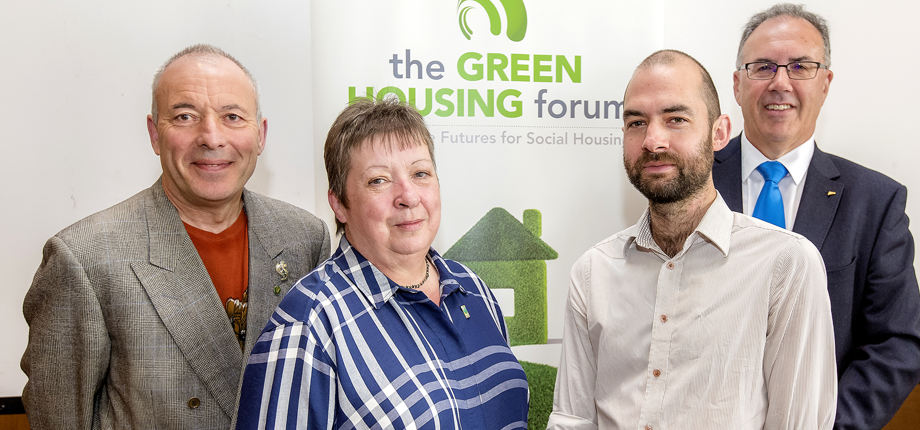The latest Green Housing Forum, sponsored by Daikin UK, examined the main barriers to the installation of low carbon heating solutions in both new, and retrofit, social housing developments and the eradication of fuel poverty. Here, Nancy Jonsson, Commercial Director for Heating and Renewables at Daikin UK reports on the discussions from the event; outlining the potential barriers to renewable technologies and how they can be overcome.
Hosted in Scotland for the first time with speakers from Energy Action Scotland, Dumfries and Galloway Housing Partnership and Sustainable Homes, the appetite and appreciation for renewable heating technology was apparent. Encouraged by the amendments to the Scottish building legislation section 6, air source heat pumps are ideally positioned to tackle fuel poverty, reduce fuel bills for residents as well as achieve Government dwelling carbon dioxide emission targets.

As approximately 845,000 households in Scotland are classified as fuel poor, discussions focused on how the entire supply chain can unite to effectively tackle the barriers to installing renewable technologies and consequently, reduce fuel poverty. With an energy label rating of A++, air source heat pumps provide a significantly more energy efficiency method of meeting on going energy and carbon targets compared to traditional heating systems.
Through the unique insight of social housing professionals at the event, several potential barriers were identified.
Tenant engagement and education was at the forefront of the discussion. A less familiar technology than the more traditional boiler, early engagement is essential to removing any preconceptions a tenant may have. Educating tenants of the value, reliability and ease of use of a heat pump system was identified as of paramount importance.
Championing those tenants who are already reaping the benefits of a heat pump was considered a successful method of achieving this. By providing detailed case studies, including cost savings and tenant quotes, the clear potential of a new low carbon system can be demonstrated to prospective tenants. This would in turn, help address the frequent occurrence of tenants reconsidering their chosen heating solution following a neighbour benefiting from air source heat pump technology.
Another area that was strongly highlighted at the event was the desire for more fully trained, experienced engineers to install, commission and maintain the new systems. The heating sector, along with the wider construction industry is currently experiencing a prolonged skills shortage, which is also impacting the uptake of low carbon technologies. Research by Engineering UK has underlined the significant gap between the demand and supply of suitably qualified engineers, with the UK required to produce more than 69,000 engineers each year to meet the increasing demand.
In addition, the distribution of available engineers was also brought into the discussion. This is seen as a particular issue within Scotland, as a majority of installers are based around the more densely populated metropolitan regions – Glasgow, Edinburgh and the central belt – leaving limited access to maintenance and on-going support for more rural areas.
In an effort to continually address these issues, Daikin UK offers extensive best practice training to the installer community. Committed to the continued growth of the renewable heating sector, Daikin UK has a number of training centres, including facilities in Glasgow, Birmingham, Bristol, Manchester and Woking. Investing in the training of more than 1,000 installers at the Woking centre alone, Daikin UK is dedicated to alleviating the strain of the skills shortage to enable the growth of the industry as a whole.
In addition, the design and launch of the Daikin Altherma Monoloc was created with new heat pump installers in mind. The all-in-one unit provides a quick and easy installation without the need for F-Gas certification, whilst presenting the many benefits of an air source heat pump for the end-user, such as high-energy efficiency, consistent performance and reduced running costs.
A forum for positive engagement and discussion amongst social housing professionals, the Green Housing Forum continues to share best practice, dispel myths, break down barriers and provide key insights into the future of sustainable housing. By encouraging the adoption of renewable heating technologies, the number of households living in fuel poverty, alongside dwelling carbon dioxide emissions, can be dramatically reduced.
Focusing on the issues the social housing providers face now and in the future, the next Green Housing Forum event will be co-located with Homes 2016 in London. Taking place on the 16th and 17th of November, the industry leading exhibition will bring together social housing professionals from across the UK to tackle sustainability within the sector.
For more information surrounding the upcoming event and to read the latest Green Housing Forum white paper, please visit: http://greenhousingforum.co.uk/
- Log in to post comments














